小学英语6年级英语语法专题突破 反义疑问句专题复习(教师版)
反义疑问句-小学英语语法专项训练六年级下册(通用,含解析)
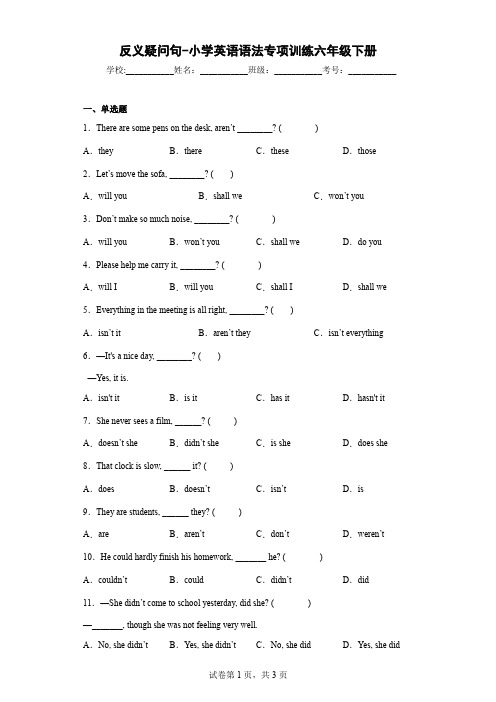
反义疑问句-小学英语语法专项训练六年级下册学校:___________姓名:___________班级:___________考号:___________一、单选题1.There are some pens on the desk, aren’t ________? ()A.they B.there C.these D.those 2.Let’s move the sofa, ________? ()A.will you B.shall we C.won’t you 3.Don’t make so much noise, ________? ()A.will you B.won’t you C.shall we D.do you 4.Please help me carry it, ________? ()A.will I B.will you C.shall I D.shall we 5.Everything in the meeting is all right, ________? ()A.isn’t it B.aren’t they C.isn’t everything 6.—It's a nice day, ________? ()—Yes, it is.A.isn't it B.is it C.has it D.hasn't it 7.She never sees a film, ______? ()A.doesn’t she B.didn’t she C.is she D.does she 8.That clock is slow, ______ it? ()A.does B.doesn’t C.isn’t D.is 9.They are students, ______ they? ()A.are B.aren’t C.don’t D.weren’t 10.He could hardly finish his homework, _______ he? ()A.couldn’t B.could C.didn’t D.did 11.—She didn’t come to school yesterday, did she? ()—_______, though she was not feeling very well.A.No, she didn’t B.Yes, she didn’t C.No, she did D.Yes, she did12.Tom hates having a maths test, ________ he? ()A.doesn’t B.does C.isn’t D.is 13.Tom’s mother usually goes to Shanghai by train, _______? ()A.isn’t she B.doesn’t she C.doesn’t he D.doesn’t Tom 14.Lily and Lucy like dancing, _______?A.aren’t they B.don’t Lily and Lucy C.don’t they D.do they 15.Your sister can’t drive a car, _______? ()A.can you B.can’t you C.can’t she D.can she 16.You are a student, _______? ()A.aren’t you B.you aren’t C.are you D.you are 17.It was Children’s Day, _______ it? ()A.isn’t B.wasn’t C.weren’t18.—It was Children’s Day, wasn’t it? ()—No, ________.A.it wasn’t B.it is C.it has D.it does 19.They won’t buy this machine,_____________? ()A.will you B.won’t youC.won’t they D.will they20.Helen often studies hard, _____ she? ()A.is B.do C.isn’t D.doesn’t 21.The computer is very useful in our life, _____________ it? ()A.isn't B.wasn't C.hasn't D.doesn't二、用单词正确形式填空22.He didn’t finish his homework, _____ (do) he?三、补全句子23.He hardly finishes his homework every day, ____ he? (反义疑问句)四、选词/短语填空选择合适的单词或短语填空。
反义疑问句句知识点+习题

反义疑问句一、学习反意疑问句,特别要注意的问题1)陈述部分的主语是this, that时,疑问部分的主语多用it;陈述部分的主语是these, those时,疑问部分的主语多用they如:This is a dictionary, isn’t it?Those are shelves, aren’t they?2)陈述句如果是there be结构时,疑问句部分仍用there。
如:There once was a man named Saint Nicholas, wasn’t there?3)在英语口语中,“I am +表语结构”,后面的反意疑问句多用aren’t I来体现。
如:I am very interested in learning English, aren’t I?4)陈述句的主语是动词不定式,动词的-ing形式或从句时,疑问部分的主语多用it来体现。
如:Taking care of our environment is very important, isn’t it?What he said is right, isn’t it?5)陈述句中含有not, no, hardly, neither, never, few, little, too …to等否定词或具有否定意义的词时,疑问部分常用肯定形式。
如:Few people knew the news, did they?Tom has never been to England , has he?但陈述句中如果带有否定意义的前缀和后缀的单词时,整个句子仍视为肯定句,反意疑问部分多用否定形式。
如:She is unhappy, isn’t she?6)陈述句的主语是nobody, no one, everyone, somebody等不定代词时,反意疑问部分的主语多用they (当强调全体时)或he(当强调个体时)。
如果陈述句的主语是something, nothing, anything, everything 等不定代词时,反意疑问部分的主语多用it。
小学英语语法---反意疑问句知识讲解
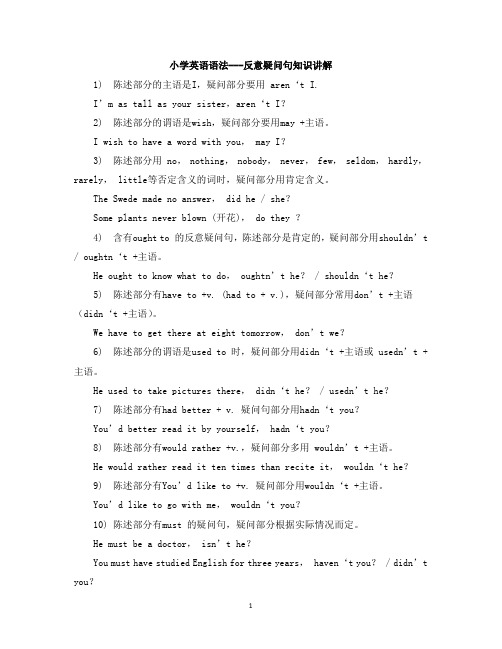
小学英语语法---反意疑问句知识讲解1) 陈述部分的主语是I,疑问部分要用aren‘t I.I’m as tall as your sister,aren‘t I?2) 陈述部分的谓语是wish,疑问部分要用may +主语。
I wish to have a word with you, may I?3) 陈述部分用 no, nothing, nobody, never, few, seldom, hardly,rarely, little等否定含义的词时,疑问部分用肯定含义。
The Swede made no answer, did he / she?Some plants never blown (开花), do they ?4) 含有ought to 的反意疑问句,陈述部分是肯定的,疑问部分用shouldn’t / oughtn‘t +主语。
He ought to know what to do,oughtn’t he?/ shouldn‘t he?5) 陈述部分有have to +v. (had to + v.),疑问部分常用don’t +主语(didn‘t +主语)。
We have to get there at eight tomorrow,don’t we?6) 陈述部分的谓语是used to 时,疑问部分用didn‘t +主语或usedn’t +主语。
He used to take pictures there,didn‘t he?/ usedn’t he?7) 陈述部分有had better + v. 疑问句部分用hadn‘t you?You’d better read it by yourself,hadn‘t you?8) 陈述部分有would rather +v.,疑问部分多用wouldn’t +主语。
He would rather read it ten times than recite it,wouldn‘t he?9) 陈述部分有You’d like to +v. 疑问部分用wouldn‘t +主语。
中小学英语语法(反义疑问句)
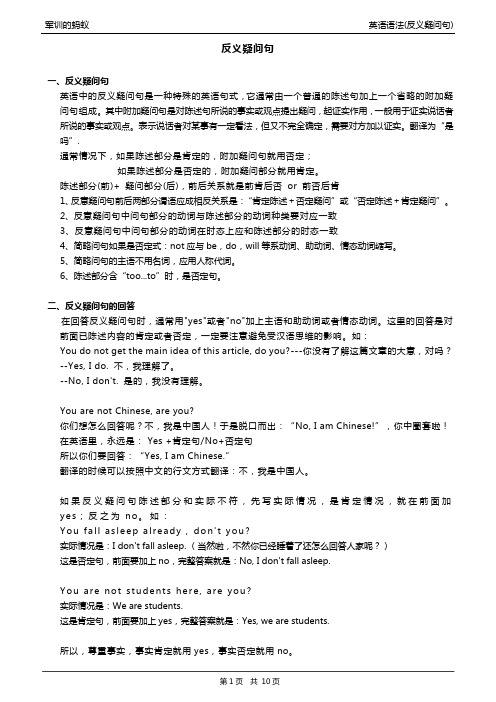
反义疑问句一、反义疑问句英语中的反义疑问句是一种特殊的英语句式,它通常由一个普通的陈述句加上一个省略的附加疑问句组成。
其中附加疑问句是对陈述句所说的事实或观点提出疑问,起证实作用,一般用于证实说话者所说的事实或观点。
表示说话者对某事有一定看法,但又不完全确定,需要对方加以证实。
翻译为“是吗”.通常情况下,如果陈述部分是肯定的,附加疑问句就用否定;如果陈述部分是否定的,附加疑问部分就用肯定。
陈述部分(前)+ 疑问部分(后),前后关系就是前肯后否or 前否后肯1、反意疑问句前后两部分谓语应成相反关系是:“肯定陈述+否定疑问”或“否定陈述+肯定疑问”。
2、反意疑问句中问句部分的动词与陈述部分的动词种类要对应一致3、反意疑问句中问句部分的动词在时态上应和陈述部分的时态一致4、简略问句如果是否定式:not应与be,do,will等系动词、助动词、情态动词缩写。
5、简略问句的主语不用名词,应用人称代词。
6、陈述部分含“too...to”时,是否定句。
二、反义疑问句的回答在回答反义疑问句时,通常用"yes"或者"no"加上主语和助动词或者情态动词。
这里的回答是对前面已陈述内容的肯定或者否定,一定要注意避免受汉语思维的影响。
如:You do not get the main idea of this article, do you?---你没有了解这篇文章的大意,对吗?--Yes, I do. 不,我理解了。
--No, I don't. 是的,我没有理解。
You are not Chinese, are you?你们想怎么回答呢?不,我是中国人!于是脱口而出:“No, I am Chinese!”,你中圈套啦!在英语里,永远是: Yes +肯定句/No+否定句所以你们要回答:“Yes, I am Chinese.”翻译的时候可以按照中文的行文方式翻译:不,我是中国人。
2024学年六年级英语专题04 语法-专项提升(人教PEP版)

专题04语法-2023-2024学年六年级英语寒假专项提升(人教PEP版)【高频易错点】Unit11.询问地点的句型及其答语:问路:Where is…?答句:It’s +表示地点的短语。
2.由what引导的感叹句,根据不同的名词形式,具体可以分为三种句型结构:(1)What + a/an + 形容词+ 名词单数( + 主语+ 谓语)!(2)What + 形容词+ 名词复数( + 主语+ 谓语)!(3)What +形容词+ 不可数名词( + 主语+ 谓语)!3.问路的常用句型:How can + 主语+ get (to)…?(莫人怎么到……呢?)Where is …?(……在哪里?)Can you tell me the way to…?(你能告诉我去……的路吗?)【讲解训练】()) 1.__________ an interesting film!A. WhatB. HowC. Where()2.-----__________ is the park?----It's near the science museum.A. HowB. WhatC. Where( ) 3. ________ a nice girl!A. HowB. WhatC. Who( ) 4. -- ________ is the hospital? -- It’s behind the bookstore.A. HowB. WhereC. What( )5. The library is in front _____ the school.A. toB. ofC. fromUnit21.询问出行方式的句型:问句:How do/does +某人+ come/go/get(to)…?某人怎样来/去/到达…?2.walk to +地点=go to+地点+by+交通工具3.“What about...”相当于“How about…”,常用语询问信息或者提出建议,后面常接名词、代词或动名词。
六年级英语下册知识讲义-语法精讲(Units 4- 6 复习)-湘少版

学习目标1. 能够掌握动名词作主语的用法。
2. 能够掌握一般将来时的含义和用法。
3. 能够掌握形容词作宾语补足语的用法。
4. 能够掌握一般过去时的含义和用法。
重点:能够运用动名词作主语,形容词作宾语补足语来正确描述物体。
难点:熟练运用一般将来时和一般过去时表达过去和将来发生的事情。
考点精讲1. Planting trees is good for us. 植树对我们有益。
本句中的主语是动名词短语planting trees。
当动名词(短语)作主语时,谓语动词用单数形式。
Exercising is good for our health. 锻炼对我们的健康有益。
_________ every day ________ a good habit.A. Read; isB. Reading; isC. Reading; are答案:B思路分析:句意为“每天阅读是一个好习惯。
”作主语的应为动名词;且动名词短语作主语时,谓语动词用单数形式,故选B项。
2. I will plant trees. 我将种树。
本句是含有一般将来时的肯定陈述句。
一般将来时由“助动词will +动词原形”构成。
助动词will没有人称和数的变化。
He will go to the cinema this evening. 今天晚上他将去看电影。
—_________ they play the piano for tomorrow’s party?—Yes, they _________.A. Do; doB. Did; didC. Will; will答案:C思路分析:根据“tomorrow’s party”可知时态用一般将来时,故选C项。
3. Trees can keep the air clean. 树木可以保持空气清新。
Trees can make the place beautiful. 树木可以让这个地方美丽。
keep the air clean 和make the plane beautiful都是“动词+宾语+形容词”结构。
小学英语六年级下册英语Unit 3~4 重难点语法归纳+典例易错对点练+语法专项习题 译林版(word版,含答案)

Unit 3~Unit 4 语法专项训练重难点语法归纳一、a ot of/ot of, man, much, ome, a few, a itte的用法1只修饰可数名词复数:man, a few2只修饰不可数名词:much, a itte3既修饰可数名词复数又修饰不可数名词:a ot of/ot of, ome练习1:单项选择。
1 —How much ________ do ou want to bu —A itteA tomatoeB riceC aeA a ot ofB a itteC a few You can’t eat ________ meat You houd eat ________ vegetabe o man; ome B too much; ome C too much;a itte4 Chinee e _________ and teamed bun for breafatA cereaB auageC uch; a few B man;a itte C man; a few二、ome和an的用法ome和an都表示“一些”,它们既可以修饰可数名词复数,也可以修饰不可数名词。
它们的区别如下:常用在肯定句中。
常用在否定句和疑问句中。
易错点提醒:1在表示提出建议、邀请或请求等的疑问句中,如果希望对方做出肯定回答,常使用ome而不用an。
2肯定句中表示“任何”时,我们要使用an。
练习2:选择合适的词填空。
1 Woud ou ie _________ ome/an ice cream2 Mie ha ________ ome/an bread and mi for breafat3 She doen’t eat ________ ome/an fruit ever da 【易错题】4 Do ou have _________ ome/an meat for unch5 Can I have ________ ome/an a ut的用法mut表示“必须”,属于情态动词,后面接动词原形。
游勇讲义反义疑问句讲解及练习
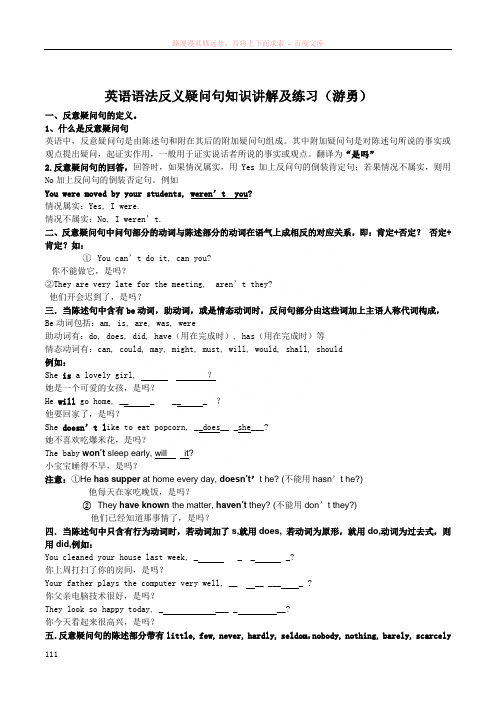
英语语法反义疑问句知识讲解及练习(游勇)一、反意疑问句的定义。
1、什么是反意疑问句英语中,反意疑问句是由陈述句和附在其后的附加疑问句组成。
其中附加疑问句是对陈述句所说的事实或观点提出疑问,起证实作用,一般用于证实说话者所说的事实或观点。
翻译为“是吗”2.反意疑问句的回答,回答时,如果情况属实,用Yes加上反问句的倒装肯定句;若果情况不属实,则用No加上反问句的倒装否定句。
例如You were moved by your students, weren’t you?情况属实:Yes, I were.情况不属实:No, I weren’t.二、反意疑问句中问句部分的动词与陈述部分的动词在语气上成相反的对应关系,即:肯定+否定?否定+肯定?如:①You can’t do it, can you?你不能做它,是吗?②They are very late for the meeting, aren’t they?他们开会迟到了,是吗?三.当陈述句中含有be动词,助动词,或是情态动词时,反问句部分由这些词加上主语人称代词构成,Be动词包括:am, is, are, was, were助动词有:do, does, did, have(用在完成时), has(用在完成时)等情态动词有:can, could, may, might, must, will, would, shall, should例如:She is a lovely girl, ?她是一个可爱的女孩,是吗?He will go home, __ _ __ _ ?他要回家了,是吗?She doesn’t l ike to eat popcorn, __does__ _she___?她不喜欢吃爆米花,是吗?The baby won’t sleep early, will it?小宝宝睡得不早,是吗?注意:①He has supper at home every day,doesn’t’t he? (不能用hasn’t he?)他每天在家吃晚饭,是吗?②They have known the matter, haven’t they? (不能用don’t they?)他们已经知道那事情了,是吗?四.当陈述句中只含有行为动词时,若动词加了s,就用does, 若动词为原形,就用do,动词为过去式,则用did,例如:You cleaned your house last week, _ _ _ _?你上周打扫了你的房间,是吗?Your father plays the computer very well, __ __ ___ _ ?你父亲电脑技术很好,是吗?They look so happy today, _ ___ _ __?你今天看起来很高兴,是吗?五.反意疑问句的陈述部分带有little, few, never, hardly, seldom,nobody, nothing, barely, scarcely等否定意义的词时,问句部分用肯定式。
2020年小升初六年级英语语法专项考点精讲+典题突破 专题10《短语辨析》(通用版含答案)

小升初英语语法专项透析专题10《短语辨析》【考点精讲】核心词汇:private, seldom, absent, fail, humorous, helpful, silent, dare, interview,general. 重点短语:1. used to 过去常常2. be afraid of 害怕3. from time to time 时常,有时4. turn red 变红5. take….up 开始做6. deal with 对付、应付7. not….anymore 不再8. tons of attention 很多关注9. worry about 为…..担忧10. be careful 当心11. hang out 闲逛12. give up 放弃13. think about 考虑14. a very small number of…极少数的……15. be alone 独处16. give a speech 做演讲17. in public 当众18. all the time 一直,总是19. on the soccer team 在足球队20. be proud of 为……骄傲21. no longer 不再22. be interested in 对…….感兴趣23. make a decision 做决定24. in person 亲自25. to one’s surprise 令某人吃惊的是26. change one’s life 改变某人的生活27. even though 尽管28. take care of 照顾29. think of 关心、想着30. 30. take pride of 为……感到自豪31.31. pay attention to 对…..注意,留心32.32. one of………….之一33. in the last few years 在过去的几年里34.固定词组:1. used to do sth. 过去常常做某事2. be afraid of doing sth害怕做某事3. give up doing sth. 放弃做某事4. have to do sth. 必须做某事5. make sb. do sth. 让某人做某事6.6. try to do sth. 尽力做某事7. adj. + enough to do sth. 足够……而能做某事8. be prepared to do sth. 准备做某事9. see sb. doing sth. 看见某人在做某事10. take up doing sth. 开始做某事11. begin to do sth. 开始做某事12. require sb. to do sth. 要求某人做某事13. decide to do sth. 决定做某某14. make a decision to do sth. 决定做某事15. It’s hard to believe that……很难相信……….16. It has been + 一段时间+ since + 从句用一般过去时自从……以来已经有很长的时间了17. dare to do sth. 敢于做某事18. It’s + adj. + for sb. + to do sth. 对某人来说做某事是……的重点句型:1. I used to be afraid of the dark. 我过去常常怕黑。
反义疑问句回答例题及解析六年级
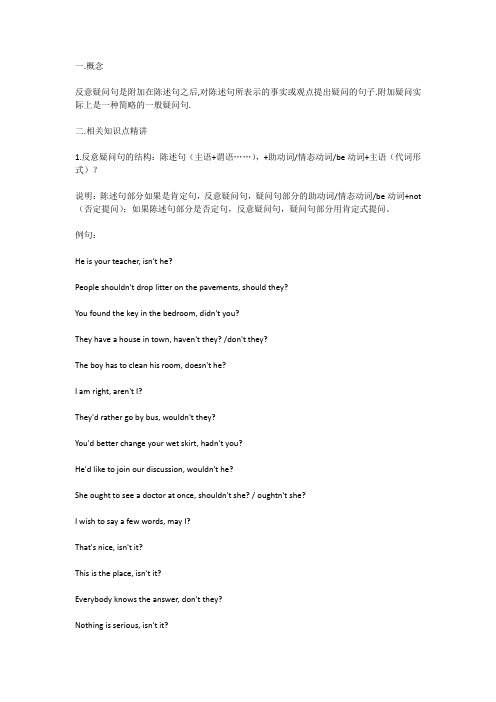
一.概念反意疑问句是附加在陈述句之后,对陈述句所表示的事实或观点提出疑问的句子.附加疑问实际上是一种简略的一般疑问句.二.相关知识点精讲1.反意疑问句的结构:陈述句(主语+谓语……),+助动词/情态动词/be动词+主语(代词形式)?说明:陈述句部分如果是肯定句,反意疑问句,疑问句部分的助动词/情态动词/be动词+not (否定提问);如果陈述句部分是否定句,反意疑问句,疑问句部分用肯定式提问。
例句:He is your teacher, isn't he?People shouldn't drop litter on the pavements, should they?You found the key in the bedroom, didn't you?They have a house in town, haven't they? /don't they?The boy has to clean his room, doesn't he?I am right, aren't I?They'd rather go by bus, wouldn't they?You'd better change your wet skirt, hadn't you?He'd like to join our discussion, wouldn't he?She ought to see a doctor at once, shouldn't she? / oughtn't she?I wish to say a few words, may I?That's nice, isn't it?This is the place, isn't it?Everybody knows the answer, don't they?Nothing is serious, isn't it?There wasn't enough time at that moment, was there?There used to a tower here, didn't there?What you need is more practice, isn't it?2.某些特殊句型的反意疑问句:1)祈使句的反意疑问句:表示肯定意义的祈使句,即表示“请求,提示”它的反意疑问句用will you 表达:有时也可以用won't you 表示。
语法专项之反义疑问句(陈述部分与疑问部分)(课件)通用版英语六年级下册

2.陈述部分有助动词
以助动词形成反问
John didn’t go to school
did he?
yesterday, Tina doesn’t want to eat cheese, does she?
won’t she?
补全疑问部分
3.陈述部分有情态动词
以情态动词形成反问
The little dog can swim in the pool, can’t he?
反义疑问句
Tom: Mr Brown, he is William Shakespeare,
isn’t he?
Mr Brown: Yes, he is.
Tom: Shakespeare wasn’t born in London,
was he?
Mr Brown: No, he wasn’t.
反义疑问句
Tom is twelve years old,___A___
A.isn’t he ? B.is he ?
My cat wasn’t at the theme park,__A___ A.was it ? B.wasn’t it ?
选择正确的疑问部分 I’m not the tallest boy in he class,__B__ A.are you ? B.am I ?
反义疑问句的基本结构
结构
You like eating chocolate, don't you?
You don’t like eating chocolate, do you?
陈述部分
疑问部分
搭配原则
前肯后___否_____
前否后____肯____
两部分的人称、时态应保持一致。
小六英语特殊疑问句反义疑问句祈使句和小升初试题训练

XXXX教育学科教师辅导讲义My favourite colour is green.My father is in the study (书房).I have a big present.Step 3:反意疑问句You are nearer to the school now, arei i t you?----- What’s the meaning?这是一个反意疑问句。
1.含义反意疑问句表示说话人的看法没有把握,需要对方证实。
反意疑问句由两部分组成,前一部分是对事物的陈述(即陈述句),后一部分是简短的提问,中间用逗号隔开。
It’s sunny, isn’t it?They speak Chinese, don’t they?2.结构结构一:前肯,+后否eg. You are beautiful, aren't you?结构二:前否,+后肯eg. You aren’t beautiful, are you?结构一:前肯,+后否be动词:1.You are an actor,?2.It was fine yesterday,?3.You were studying when I called you last night,?行为动词:1.It often rains here,?2.You have a headache,?3.I called you yesterday,?其它动词:1.You will go to America,?2.You can speak English,?结构二:前否,+后肯1.You aren't an actor,?2.It do esn't rain here,?3.His sister doesn't have a headache,?4.You won't go to U.S.A.,?5.There isn't a boy in our classroom,?6.They can't speak English,?3.回答不管问题是怎样问的,只要回答的事实是肯定的(即“真的”或“对的”),就要用yes;只要回答的事实是否定的(即“假的”或“错的”),就要用no。
六年级英语反意疑问句单选题40题(含答案)

六年级英语反意疑问句单选题40题(含答案)1.She is a student, isn't she?A.is sheB.isn't sheC.are sheD.aren't she答案:B。
本题中,前半句是肯定句“She is a student”,be 动词是is,主语是she,根据反意疑问句“前肯后否,前否后肯”的规则,后面应该用isn't she。
A 选项is she 不符合规则;C 选项are she 中be 动词错误;D 选项aren't she 中主语错误,当主语是she 时,be 动词应该是isn't。
2.He is at school, isn't he?A.is heB.isn't heC.are heD.aren't he答案:B。
前半句“He is at school”是肯定句,be 动词是is,主语是he,反意疑问句应为isn't he。
A 选项is he 不符合规则;C 选项are he 中be 动词错误;D 选项aren't he 中主语错误,he 对应的be 动词是isn't。
3.They are friends, aren't they?A.are theyB.aren't theyC.is theyD.isn't they答案:B。
“They are friends”是肯定句,be 动词是are,主语是they,反意疑问句为aren't they。
A 选项are they 不符合规则;C 选项is they 中be 动词错误;D 选项isn't they 中be 动词和主语不对应。
4.She is happy, isn't she?A.is sheB.isn't sheC.are sheD.aren't she答案:B。
六年级英语 语法专项练习 反义疑问句 人教新起点

小升初英语语法专项练习(liànxí):反义疑问句反义疑问句填词(tián cí)完成反义疑问句. He wouldn't wait in line the next day ,______ ?2. She has been learning English , _________ ?3. We can't take the books out ,________ ?4. He has to go home on foot , ________ ?5. You haven't had your lunch ________ ?6. We have nothing to eat, ________?7. They dislike the book,________ ?8. There used to be a post office in the street ,________ ?9. He said that he would not go with us ,________ ?0.We must hand in the exercises , ________ ?.You dare to jump off the wall ,________ ?2. He made a few mistakes in his exercises , ________ ?3 She must be a music lover ,________ ?4. I suppose you know her address ,________ ?5. I don't think you 're serious , ________ ?6.Let us do the jobs by ourselves ,________ ?7. He used not to smoke , usedn't he ?_____,he used to . The doctor always tells him not to .8. Do the homework by yourselves , ________ ?9 Let's enter the hall ,________ ?20 .You must have seen him yesterday ,________ ?2. I think he can swim , _________ ?22. My parents are watching TV,______________23. There is little milk in the fridge,_____________24. You have nothing to do now,_______________25. Peter likes flying a kite in spring,____________26. There is nobody in the sittingroom,__________27. Lucy, as well as Peter, is here,_____________28. Everything is ready,_____________29. Her father drove to work yesterday,___________6.have we 3.isn't she 9.will you 20.didn't内容总结(1)小升初英语语法专项练习:反义疑问句反义疑问句填词完成反义疑问句. He wouldn't wait in line the next day ,______ (2)小升初英语语法专项练习:反义疑问句反义疑问句填词完成反义疑问句. He wouldn't wait in line the next day ,______。
- 1、下载文档前请自行甄别文档内容的完整性,平台不提供额外的编辑、内容补充、找答案等附加服务。
- 2、"仅部分预览"的文档,不可在线预览部分如存在完整性等问题,可反馈申请退款(可完整预览的文档不适用该条件!)。
- 3、如文档侵犯您的权益,请联系客服反馈,我们会尽快为您处理(人工客服工作时间:9:00-18:30)。
6 反义疑问句专题复习(教师版)课首沟通了解学生的学习情况知识导图课首小测1. [单选题] [语音综合] [难度:★★★ ]选出单词划线部分哪一个与其他三个读音不同。
A. bearB. earlyC. earthD. heard【参考答A案】2. [单选题] [语音综合] [难度:★★★ ]选出单词划线部分哪一个与其他三个读音不同。
A. schoolB. lookC. foodD. soon【参考答案】 B 【题目解析】 oo 在字母K ,d 前发短元音/ u /,除了小叛徒food 外。
【学有所获】oo 在字母K ,d 前发____________,除了小叛徒___________外。
3. [单选题] [语音综合] [难度: ★★★ ]选出单词划线部分哪一个与其他三个读音不同。
A. Thursday B. doctor C. teacher D. supper【参考答案】A 4. [单选题] [语音综合] [难度: ★★★ ]选出单词划线部分哪一个与其他三个读音不同。
A. thousand B. month C. thank D. clothes【参考答案】D 【题目解析】 th 发浊辅音/ð /的规则:代词(人称代词:they, them; 物主代词:their, theirs; 指示代词:this, these, that, those )以ther 结尾的词 特殊记:the, then, than, there, with, clothes【学有所获】th 发浊辅音/ð /的规则:__________________________________________________ 5. [单选题] [语音综合] [难度: ★★★ ]选出单词划线部分哪一个与其他三个读音不同。
A. become B. many C. renew D. before【参考答案】B 6. [单选题] [介词综合] [难度: ★★★ ]Jim usually plays basketball with his friends __________ Sunday morning. A. in B. on C. at D. with【参考答案】B【题目解析】on+星期,具体的某一天,具体某天的早上、下午、晚上,含有Day 的节日 【学有所获】 on 后跟______________________________________________________in 后跟______________________________________________________at 后跟______________________________________________________7. [单选题] [介词综合] [难度: ★★★ ]Jiaming is going to have a party __________ next Saturday. A. in B. on C. at D. /【参考答案】D 【题目解析】 在this, every, tomorrow, next, last, yesterday 引导的时间状语前,不需要用介词。
【学有所获】 在this, every, tomorrow, next, last, yesterday 引导的时间状语前,不需要用__________。
8. [单选题] [代词] [难度: ★★★ ]Chen Pin is showing __________ her photos album. A. we B. our C. us D. ours【参考答案】C 9. [单选题] [动词] [难度: ★★★ ]There __________ some milk in the glass. A. is B. are C. has D. have【参考答案】 A 【题目解析】 milk 是不可数名词,there is+可数名词单数/不可数名词;there are+可数名词复数 【学有所获】there is+__________________________; there are+____________________________ 10. [单选题] [不定代词] [难度: ★★★ ] Is there __________ in the book? A. special something B. something specialC. special anythingD. anything special【参考答案】D 【题目解析】 形容词位于复合不定代词(something, anything, someone, anyone 等)的后面,any/anything 用于否定句和疑问句;something 用于肯定句。
【学有所获】形容词位于复合不定代词(something, anything, someone, anyone 等)的___________. 11. [单选题] [固定句式] [难度: ★★★ ]--- Must we borrow books with an ID card? --- __________.A. No, you mustn’tB. No, you can’tC. No, you needn’tD. No, you shouldn’t【参考答案】 C 【题目解析】 以Must 开头的疑问句的否定回答,用needn’t, 不是mustn’t。
【学有所获】以Must 开头的疑问句的否定回答,用___________. 12. [单选题] [冠词] [难度: ★★★ ]Tim is __________ honest child. Everyone likes him. A. a B. an C. the D. /【参考答案】 B 【题目解析】 a 用于辅音因素前, an 用于元音因素前,由于hoest 第一个h 没有发音,字母o 发元音,因此选B 。
【学有所获】a 用于__________前, an 用于_________前。
变式训练:__________ apple, __________ old man, __________ umbrella, __________ useful book, __________ uniform,__________ university, __________ European stamp ,__________ m, __________ u 13. [单选题] [数词] [难度: ★★★ ]The subway is fast and now __________ people take it in Tianjin every day. A. two thousands B. thousand of C. thousands of D. two thousands of【参考答案】C 【题目解析】 hundred, thousand 前有数字时,不能加“s”,如果后面有of 时,则需要加“s”,hundreds of 数以百计;thousands of 数以千计【学有所获】hundred, thousand 前有数字时,_____________________,如果后面有of 时,则____________________. 14. [单选题] [动词] [难度: ★★★ ]The lion lets the mouse __________. A. goes B. going C. go D. is going【参考答案】 C 【题目解析】let sb. do sth. 即let 后跟动词原形 【学有所获】 搭配动词原形的词汇还有:let sb. do sth, ________________________________________15. [单选题] [动词] [难度: ★★★ ]Stop __________ please, your father is sleeping. A. talk B. talking C. to talk D. talks【参考答案】B 【题目解析】 stop doing sth. 表示“停止做某事”;stop to do sth. 表示“停下来去做某事”。
stop talking 表示“停止说话(即不要说话)”,根据句意:不要讲话了,你的爸爸正在睡觉。
【学有所获】停止做某事:______________________________; 停下来去做某事:______________________________ 16. [句型转换综合] [难度: ★★★ ]He can keep the dictionary for two weeks. (就划线部分提问)__________ __________ __________ __________ keep the dictionary?【参考答案】 How long can he 【题目解析】how long 表示“多长时间”,是对for+一段时间的提问。
17. [句型转换综合] [难度: ★★★ ]He waited for the hare in the fields for a whole week. (就划线部分提问)__________ __________ __________ __________ for the hare for a whole week?【参考答案】Where did he wait18. [句型转换综合] [难度:★★★ ]She cooked the food and ate it up. (变成一般疑问句)__________ __________ __________ the food and __________ it up?【参考答案】Did she cook, eat19. [句型转换综合] [难度:★★★ ]David does his homework at 5 o’clock every day. (改为否定句)David __________ __________ his homework at 5 o’clock every day.【参考答案】doesn’t do【思维对话】思维障碍:把句子中的does看成助动词,直接在后面加not,构成答案does not。
突破方法:先举例法:David plays football at 5 o’clock every day. 再把这个句子改为否定句。
